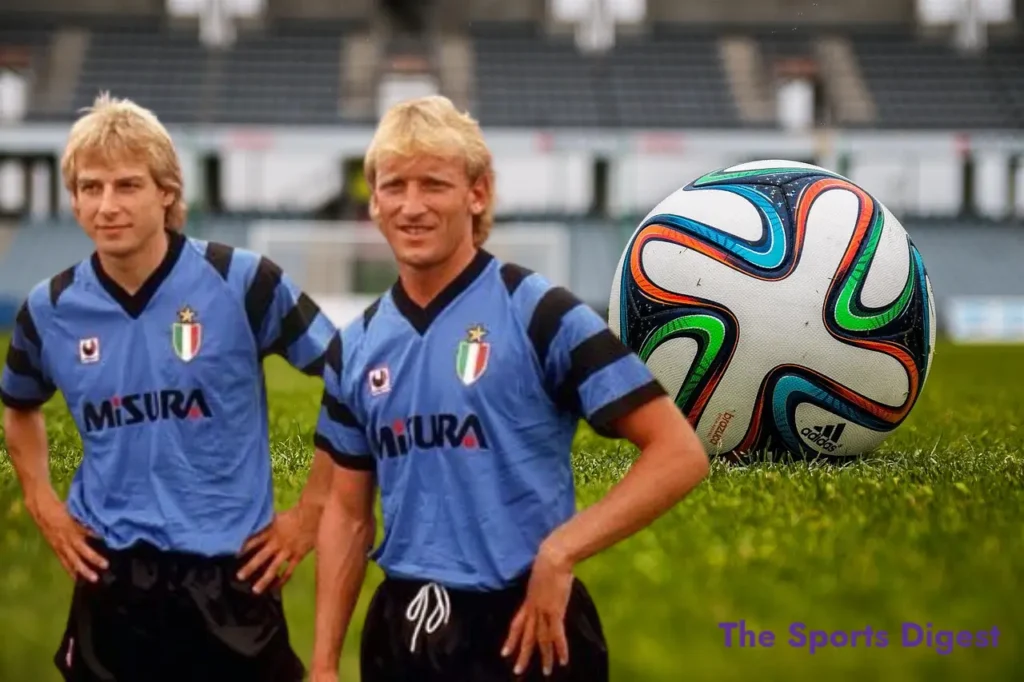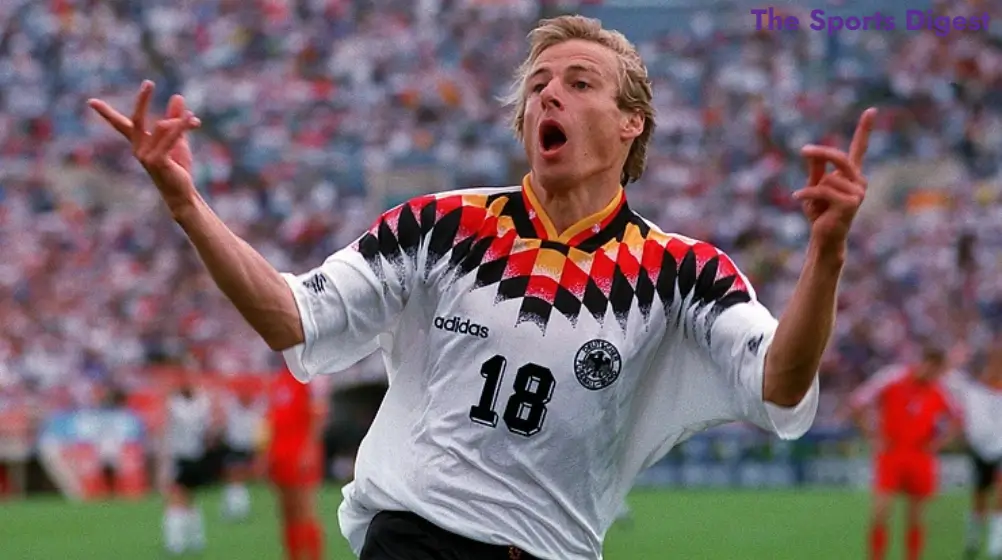Jürgen Klinsmann: A Legendary Football Inspiration
Jürgen Klinsmann is one of the greatest figures in German football history. He excelled as a striker during his professional career and continued to influence the game as a coach after retirement. With his speed, precision in finishing, and exceptional positioning inside the penalty area, he became one of the most distinguished forwards of his generation. Later, as a coach, he revolutionized modern playing styles, making him a key sports figure.
Table of Contents
Early Life and Football Beginnings
Jürgen Klinsmann was born on July 30, 1964, in Göppingen, West Germany. Growing up in a sports-oriented family, he started playing football at a young age. He joined Stuttgarter Kickers in 1981, where he began his professional career. Over three seasons, he showcased his goal-scoring abilities, netting 21 goals in 61 matches, drawing attention to his talent.
Rise to Stardom with Stuttgart
In 1984, Jürgen Klinsmann made a significant move to VfB Stuttgart, marking the beginning of an important phase in his career. Over the next five seasons, he became an essential player for the club, showcasing his exceptional talent and goal-scoring ability. Jürgen Klinsmann scored 79 goals in 155 matches, solidifying his reputation as one of the best strikers in the Bundesliga. His consistent performances at Stuttgart caught the attention of both domestic and international scouts. During this period, he not only helped Stuttgart secure important victories but also developed his playing style, becoming known for his agility, finishing, and leadership.
This period in the Bundesliga was crucial for his development as a footballer, and it opened the door for him to take the next step in his career, eventually leading to a successful international career with the German national team. Klinsmann’s time at VfB Stuttgart remains a key chapter in his rise to fame in European football.
European Club Career
- Move to Inter Milan : In 1989, Jürgen Klinsmann joined Italian giants Inter Milan, playing for three seasons. He scored 34 goals in 95 matches and was part of the squad that won the UEFA Cup in 1991.
- Success with AS Monaco : In 1992, he transferred to AS Monaco in France, where he played for two seasons. He netted 29 goals in 65 matches and helped the team reach the UEFA Champions League semi-finals.
- Experience with Tottenham Hotspur : In 1994, Jürgen Klinsmann moved to English club Tottenham Hotspur, scoring 30 goals in 56 matches. He won the club’s Player of the Season award, becoming a fan favorite.
- Return to Germany with Bayern Munich : In 1995, he joined Bayern Munich, scoring 31 goals in 65 matches and helping the club win the Bundesliga and UEFA Cup.
- Final Playing Years : Jürgen Klinsmann later had short stints with Sampdoria in Italy and a return to Tottenham before ending his career in the United States with Orange County Blue Star.

International Career with Germany
Jürgen Klinsmann played a pivotal role for the German national team, contributing to their success in several prestigious tournaments. His most notable achievement came in 1990 when he was part of the squad that won the FIFA World Cup in Italy. Klinsmann’s skill and leadership were crucial in Germany’s triumph, as he scored vital goals during the competition. He also helped Germany secure the UEFA Euro 1996 title, further cementing his place as one of the country’s greatest footballers. Throughout his international career, Klinsmann scored over 40 goals, making him one of the top strikers in Germany’s football history.
His speed, technical ability, and finishing made him a constant threat on the pitch, and his versatility allowed him to shine in various attacking roles. Klinsmann’s contributions to the national team were key to Germany’s success in the 1990s, and his legacy in international football remains influential. His achievements on the world stage solidified his reputation as a true football legend.
Coaching Career
After retiring from playing, Jürgen Klinsmann smoothly transitioned into coaching, starting with the German national team in 2004. He brought fresh ideas and a tactical approach that emphasized attacking football, and under his guidance, Germany reached the semi-finals of the 2006 World Cup. His leadership during the tournament earned him widespread praise for revitalizing the national team, focusing on player development and creating a positive atmosphere within the squad. Following his success with Germany, Klinsmann took on the managerial role at Bayern Munich in 2008.

Although his tenure was short, his influence on the team’s playing style and emphasis on a modern approach were notable. In 2011, he took over as head coach of the U.S. national team, where he helped improve the team’s overall performance and competitiveness on the international stage. His tenure saw a more structured and disciplined U.S. team, with an emphasis on youth development and playing a more attacking style of football. Klinsmann’s coaching career left a significant impact, both on the teams he managed and on the broader footballing world.
Klinsmann’s Playing and Coaching Style
- As a Player : Klinsmann was known for his speed, sharp finishing, and intelligent movement, making him one of the most effective forwards of his era.
- As a Coach : He embraced modern coaching methods, emphasizing fitness and high-pressing tactics, which helped develop the teams under his management.
Jürgen Klinsmann’s Legacy in Football
Jürgen Klinsmann’s success as both a player and coach has solidified his status as one of the most influential figures in German football history. His achievements on the field, including World Cup and Euro victories, are matched by his contributions as a coach, where he brought a new tactical outlook to the teams he managed.
Klinsmann’s impact extends beyond results, as he inspired generations of footballers with his work ethic, leadership, and innovative approach to the game. His influence is still felt today, with many players and coaches citing him as a role model. As a footballer and a coach, Klinsmann’s legacy remains a defining chapter in the history of the sport.
Conclusion
Jürgen Klinsmann is more than just a former player or coach—he is a true football legend. His exceptional skills and goalscoring ability made him a standout figure during his playing career, with success at both club and international levels. As a coach, he brought a fresh perspective and tactical innovation, leading teams like Germany, Bayern Munich, and the U.S. national team to notable successes.
Klinsmann’s impact transcends trophies, as his approach to the game and his leadership have inspired countless players and coaches. His name remains etched in football history, symbolizing excellence and passion for the sport.
Have you ever read an article like this?
There are no reviews yet. Be the first one to write one.






